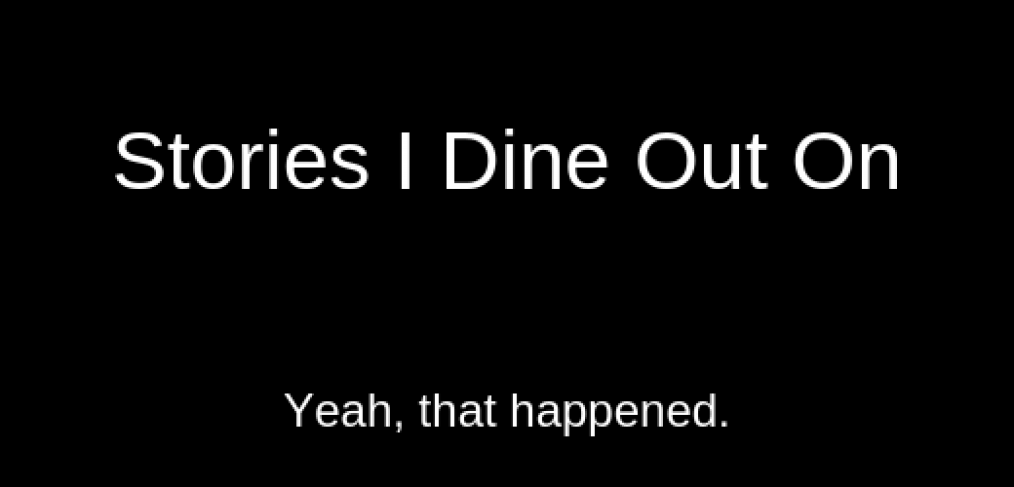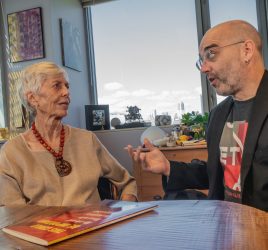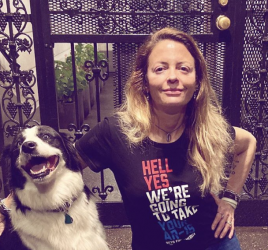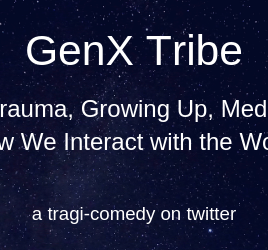
My Life With Jim Carroll + Hunter S. Thompson, or Why I Became A Writer
Jim Carroll died today.
This is weird for me. But not in the same way that it was weird for me when David Foster Wallace died. Or Hunter S. Thompson died. Those two days were low points in a life that was already spiraling out of control. Dark, evil days. Those two writers were the part of the foundational rock that I’ve build my writing career around. The writers I looked to when my own voice, my own stories, my own life seemed so woefully inadequate.
Carroll, though, wrote poetry. Or mostly poetry. Or I knew him for poetry. Which is exactly the kind of writing I have no time for.
And yet 15 years ago at the start of my professional writing career, it was Carroll who inadvertently fueled my wildest dreams about what my life could be as a writer. Ironically, the story that came out of this was the only story I’ve ever written for a publication that didn’t get printed.
But I’m getting ahead of myself.
Act 1
Cincinnati, Ohio. October, 1994. A recent college graduate gets hired by a start-up weekly newspaper, Cincinnati Citybeat, as a news aide. He has absolutely no training as a journalist. No idea what he is supposed to do. His friend Kris recommended him to the editor-in-chief. Neither his complete lack of knowledge about the industry nor his non-existent writing skills keep him from expecting to write a cover story. He pitches his idea: a poetry festival in Louisville where Jim Carroll is reading.
That is the backdrop for the story. But that is not an exhaustive list of pertinent facts.
I was engaged to a woman in the small town country way. The way that doesn’t include a ring. A plan. A potential future. Instead, it’s in the way that involves a conversation stream that after hours of meandering turns into a “we should just do this” tributary, which seems like a really good idea at the time.
We were both graduating from Miami University in December. She was moving to New York City to live for a year while she applied to graduate school. I would stay in Cincinnati to write during that year. We would meet up wherever she got into school.
When I got the news aide gig at Citybeat, we were excited. The plan, as it were, was coming together. We were winding down the college part of our lives, ready to start the next adventure.
Act 2
Through the magic of the Internet, a toy the recent college graduate had been playing with for a decade, he stumbles across a discussion board about this non-stop poetry and literary festival happening in Louisville. And Jim Carroll is reading from The Basketball Diaries, a soon-to-be major motion picture starring one Leo DiCaprio. The young news aide pitches the story to the editor-in-chief, who agrees this might make a fine story for the paper, which is set to launch in January.
When my editor said yes to the story, I nearly passed out. I’d never pitched a story, outside the school newspapers and the silly ‘zine I’d helped found. I’d certainly never had someone tell me the idea was good. And I most certainly had no idea what in the hell I was doing.
But that didn’t matter. I was headed to Louisville to cover the Insomniacathon was a 24-hour poetry and literary festival. It never shut down. Which was good because I didn’t have any money for a hotel. And the newspaper wasn’t paying for some news aide to shack up for the night.
I grabbed my laptop (I had one back then), a hulking tap recorder, a backpack full of notepads and pens, threw them in the car and took off. I convinced the girl to come as well. Without one shred of background, one plan for covering the event, one notion that I might want to ask an editor what to do. We were off. To Old Bardstown Road.
Act 3
The young writer and his girlfriend arrive. Eventually. They are lost in Louisville for some time as neither of them had ever traveled into Kentucky. Louisville was like a foreign land. When they arrived at one of the sparsely populated clubs, the music was blaring so loud they couldn’t hear themselves think. The writer continued to ask who was running this show. The name Ron Whitehead, unknown to him then, continued to come up. Eventually he found him. They went to the club together. He introduced them to Jim Carroll, a skinny, gangly man with a sunken face and eerily pale-ish yellow skin. He agrees to a speak with him after the reading. The writer and the girl take their seats in the front, sitting on the floor, legs crossed, book bag, computer bag and notes strewn around.
I had no interest in poetry. And little idea who Jim Carroll was. But I knew his name. And for me to know a poet’s name is something. It wouldn’t be until a year later that I realized he’d been the front man for the Jim Carroll band. Or that he’d played with Patti Smith. Or that he was friends with Marc Smith, who started the poetry slam movement in the United States.
I didn’t know any of this. I just knew he was the main draw of this program.
He read from his book, a dog-eared copy. His hands were shaking. Visibly but not uncomfortably. But I noticed. Addicts notice these things. And I’d been sober for nearly four years. At 21.
Between readings, I scribbled down notes. Incomprehensive notes about the scene. Trying with my 21-year old sensibility to put into context the noir quality of smoke rising into the spotlight around this gaunt, skeletal creature before it slid into the darkness above him. He flipped between pages after each poem, improvising his set list. Giving me time to scan the room, getting those details that make stories so good.
Or, should make them good.
Which is when I saw the cigarette. The black holder, five inches long maybe, in one hand. A martini glass in the other. The tinted 70s sunglasses that I’d seen on the cover of the books in my apartment’s bedroom.
There in the back was Hunter S. Fucking Thompson. Leaning against the wall. In obscurity. Hidden by the low lights and the wall of smoke.
(There are two kinds of people in this world: people who like Thompson because they think he writes about drugs and bucking the system and living life on your own terms and all that non-sense and people who understand he was writing about the American Dream. I fell into the second category. Although I would certainly end relating to the first.)
Now I had to figure out how I was going to make my way back to him without Carroll noticing that his front row had disappeared.
Which meant that every poem that Carroll read was turning into the Leaves of Grass, dragging on endlessly. What I needed was for him to finish a poem and then devolve into a manic bastard who couldn’t decide what to read next. Giving me time to sneak to the back while the girl played Oscar Chair Seater and maintained the appearance of a full house.
Suddenly, though, Carroll had a bout of clarity and read poem after poem after poem. I have no idea how long that lasted. Every second was too much. I stopped taking notes. I stopped thinking about my story. I stopped thinking about everything.
Duke was in the house.
At some point between the rapid fire reading, I announced loudly enough to be heard, that I had to use the restroom. Which I did not. Instead, I beelined to the back, walked up to Thompson and stared. For what I am sure would be described by him as an uncomfortable amount of time.
“Hey,” I mustered.
<inaudible> as he sips his drink.
“Pretty good show. I’m a big fan.”
<inaudible>
Act 4
Carroll’s set ends. Whitehead shuffles him off to his hotel, which is down the street. We follow because they have both forgotten the promised interview. These things happen to 21-year old writers with no plan and no experience. But we apparently look like the kind of people who should be in Carroll’s room. And the writer acts as if he’s supposed to meet the two poets here. They are ushered upstairs. The elevator doors open. Carroll is standing above an open briefcase. He makes eye contact, closes the briefcase and disappears into the bedroom. But there’s something strange. Lights. Everywhere. And shit, television cameras. We are observers to a television interview about the Beat poetry movement in New York City in the 1970s.
We will not be allowed to ask Carroll any questions. Assuming he returns (which he does). But we are welcome to stay.
We stayed there until the sun came up, intermittently falling asleep on the tile floor in the suite, and watching as Carroll waxed on about poetry, punk rock, literature, the movie and scores of other topics I can’t remember anymore.
All I really remember is waiting and wondering. Waiting for Carroll to return from the bedroom. Wondering what was in the briefcase. Waiting for the documentary crew to finish up. Wondering what I was going to ask. Waiting for the story to find me. Wondering how I would ever write this so that people knew it was real.
Act 5
Back in Cincinnati, the young writer watches a documentary on Walter Winchell. He falls in love with the ellipsis…No realization that these are bad. Mostly. That style is not for the weak of heart and the light of talent. He is both. He doesn’t realize it. Yet. Maybe he won’t…it’s hard to tell. Regardless, he should not be tinkering with the glitz and glmar of the language. Yet. He should have watched Dragnet. These are things that we must learn the hard way along the road to perdition.
After a good night’s sleep, which lasted most of the weekend, I worked on the story for hours. Writing. Editing. Changing the form and style. Trying to capture what I had just experienced without actually understanding what it was I experienced.
Eventually I settled on a tabloid, Winchell-esque style. Which was a mistake. My editor-in-chief, so gung-ho about the story, came over to me after I’d turned in my piece and said simply: “We can’t run something like this.”
I was incensed. And convinced I was going to be fired since that was the first piece of writing I’d done. I refused to re-write it. If they didn’t want my genius, screw them I thought.
How do you take an event like that, just 90 minutes away, and ruin it? That’s how.
Epilogue
We’ve come a long way for a story that seems, on its surface, to be about not being a very good writer. There is more to it than that, though, although it’s certain a story about not being a very good writer, too.
That 24-hour period convinced me that writing was my future. I wanted what Carroll had. I wanted what Thompson had. For as awe-struck as I was, I felt a kindred spirit with them. A tangible, touchable thing that only I felt. But I felt it. When my editor-in-chief dumped the story, I didn’t even care. Because I knew I was a writer. Carroll taught me that.
Post Script
Several months later, I’d quit my job with Citybeat, the girl dumped me and I was drinking again. Still I managed to convince the other weekly paper in town to let me write a story on the Bumbershoot Music Festival in Seattle, WA (and that’s a story for another day). As it turned out, Carroll was reading there.
I finagled my way back stage, where I ran into him. And he remembered me. Recognized my face (although he couldn’t place me until I said Louisville). Then asked me how I was doing before telling the usher that I was with him.




The Internet's magic seemed a lot cooler back then, didn't it?
Yeah. When I think back to my childhood, and even my early adulthood, I’m so thankful that I had access to the tools that I did. But man, it was a long ride trying to convince people they had value.
The Internet's magic seemed a lot cooler back then, didn't it?
test
I am a huge fan of Jim Carroll too, and was shocked that he died. And sad of course. Nice story about your memory of him. Thompson's ok too I guess 😉
p.s. I joined the “cult” at 21.